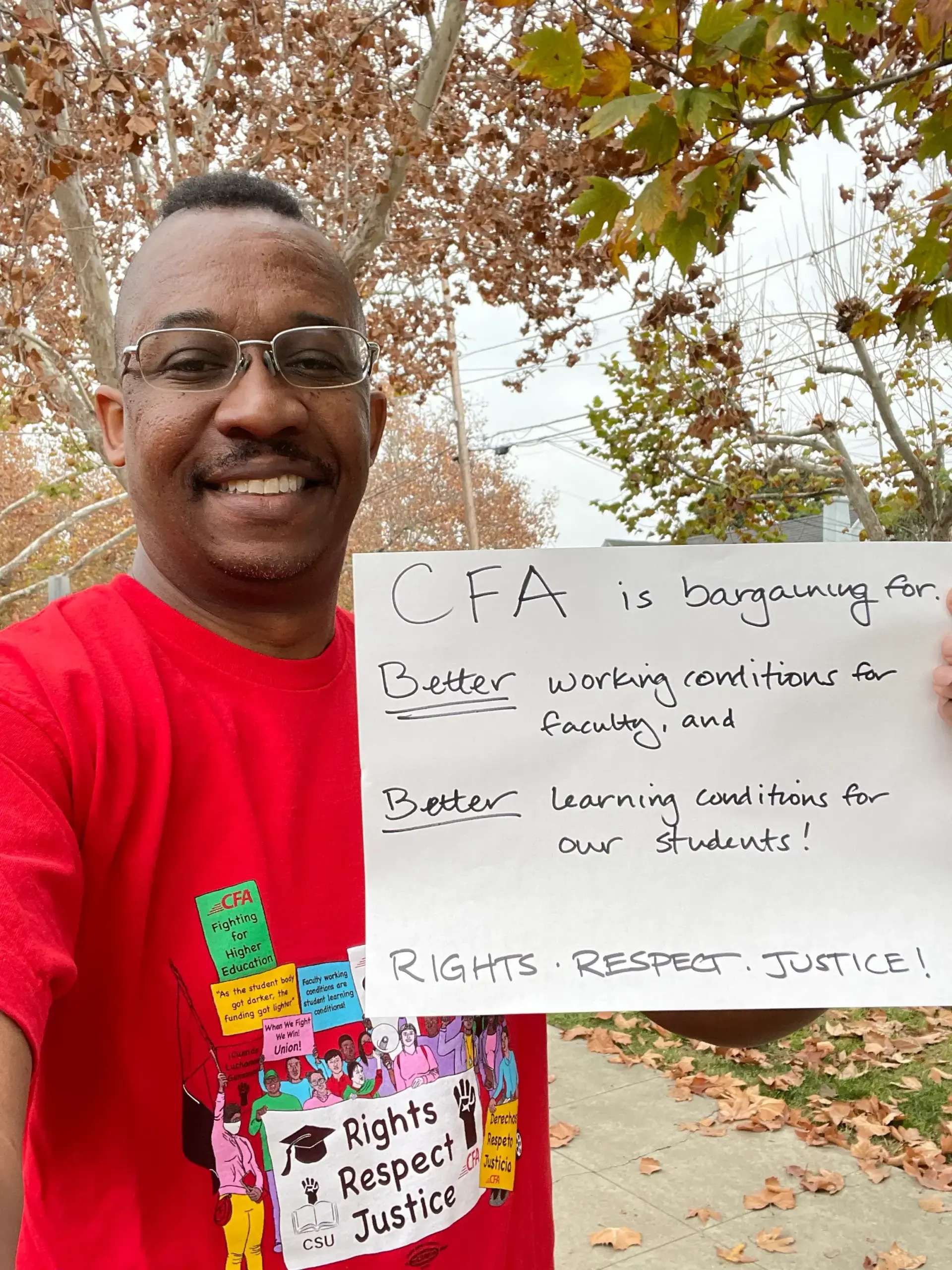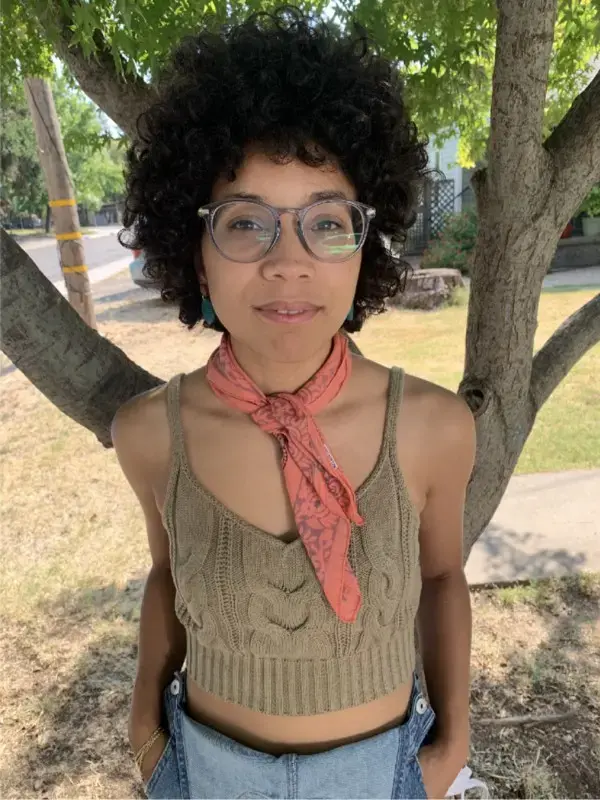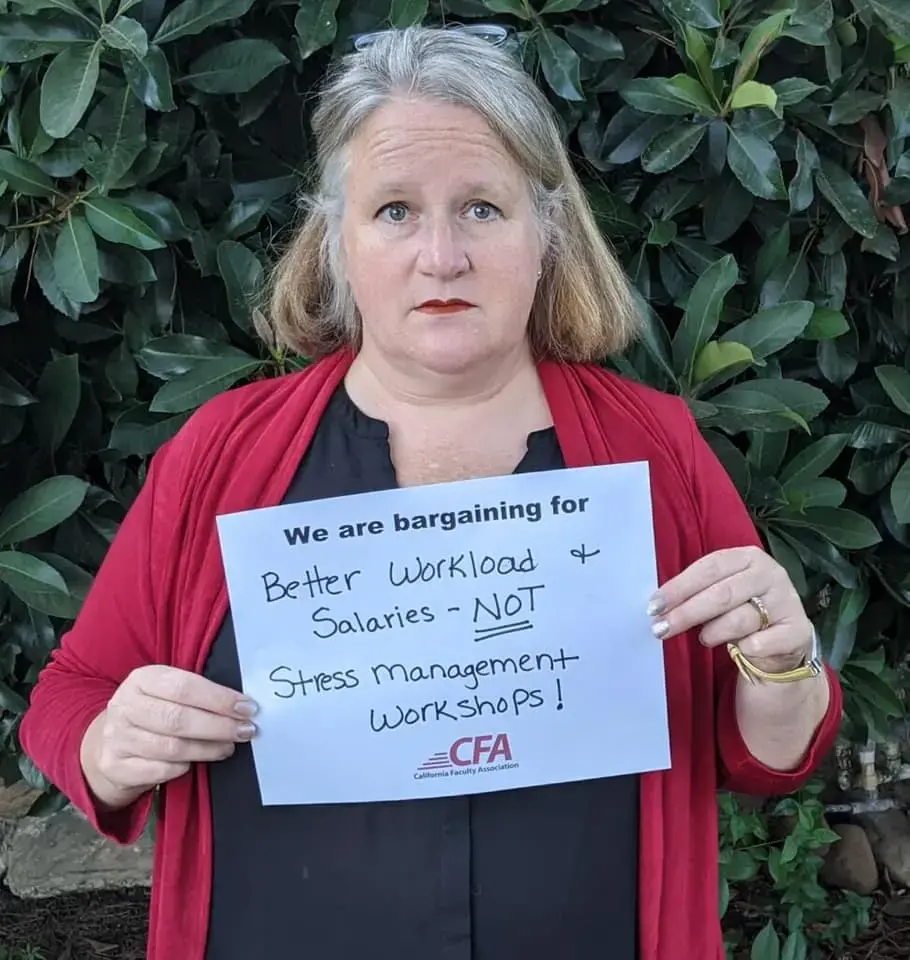CFA Fights for Environmental Justice and Less Reliance on Armed Police
Five to six officers from University Police and local police departments arrived to do a wellness check on a Black student during class at CSU San Marcos. The student was taken against their will to the hospital. Several students witnessed this “intervention.”
“This student is left with an enormous hospital bill and the trauma of being forcefully removed all because there are no alternatives in place to help students and faculty,” said Julianna Gutierrez, sixth year CSU San Marcos student.

Students are best prepared to learn and thrive when they are safe and healthy at their college campuses. That is why improving student and faculty health and safety has been, and continues to be, a critical priority for bargaining. The goal is to strengthen the ways the CSU addresses the impact of racism on our campuses by designating alternatives to campus police and appointing trained personnel to handle employee conflicts.
University Police Departments (UPD) oftentimes are the only response measure on most campuses. There are situations that call for an intervention between two or more parties in conflict, but that do not need to escalate to a level where armed law enforcement is involved. Most conflicts do not involve any criminal behavior or threats against anyone’s personal safety.

“When police arrive, conflicts can actually be exacerbated in multiple ways. At the least, it can increase the level of animosity between colleagues – particularly on the part of the person against whom police are called,” said Chris Cox, CFA Associate Vice President of Racial & Social Justice, North, and sociology lecturer at San José. “When the police are called against faculty members of color, there is room for biases (both conscious and unconscious) to interfere with who is seen as ‘perpetrator’ and who is seen as ‘victim.’”
CFA members and students also report an overreliance on police. Police tend to escalate situations, such as putting their hands on their guns while pulling over a student riding a bike, said Melys Bonifacio-Jerez, a third-year sociology major at Chico State.

“If students don’t feel safe at school, how are we supposed to learn?” Bonifacio-Jerez asked.
Our proposal calls for trained people on each campus to handle disputes, instances of racism, sexism, homophobia, transphobia, and other violence among faculty and students.
Beyond the horrifying and all-too-common anecdotes, we need to ensure that evidence-based practices are put in place for how campuses handle non-criminal health and safety situations, said Akhila Ananth, associate professor of criminal justice at Cal State Los Angeles.
“Just as the city of Los Angeles and many other jurisdictions are moving toward using specialized teams to address situations where mental health diagnoses play a role, this proposal puts in place mechanisms for the CSU campuses to provide the same ethical protections for students, faculty, and staff,” Ananth said.
“Students can learn, and faculty and staff can work only in conditions that are safe for everyone on campus. By ‘safe,’ I mean ‘free from violence,’ including the potential violence of armed police,” she added.
CSU San Marcos’ Gutierrez came across a suicidal community member on a parking structure on campus. While she was able to calm down the student, police arrived.
“The student fears police, and the officer was aggressive, rude, and interrogated the student. UPD is not equipped to deal with mental health situations. UPD is there as a response measure, not as a preventative measure,” said Gutierrez, a member of Students for Quality Education who, along with Bonifacio-Jerez and other SQE members, is working to defund UPDs and reinvest funding into resource-starved student support services like mental health and Black student resource centers.
“We need to provide people with the resources to keep them safe. Campuses work on providing us with food and shelter, the basics necessary so we can focus on our education. We need the same resources to help with our mental health,” Gutierrez said.
Our health and safety bargaining proposal also calls for CSU management to recognize the impacts of natural disasters like wildfires, floods, and pandemics on faculty working and student learning conditions, and plan accordingly with modern notification systems and telecommuting policies.
Gutierrez happens to be double majoring in biology with a concentration in ecology and environmental studies at CSU San Marcos, so is very familiar with climate change and environmental justice. Gutierrez emphasizes the need for transparency from CSU management.
“(CSU administrators) need to be prepared for natural disasters. With COVID-19, they were not prepared. COVID-19 is just the start. These wildfires are just the start. We need to have systems in place so students can continue our education,” Gutierrez said.
Many CSU campuses have experienced the negative health impacts and community trauma that come with the state’s increasing wildfire danger. Communities around Chico State are still reeling from 2018’s Camp Fire.
“What looked like a weird thunderhead or storm cloud at a gas station at 8 a.m. was the start of a years-long crisis we are still dealing with every day,” said Susan Green, associate professor of multicultural and gender studies at Chico State. “The terror of not being able to find loved ones touched everybody, and the sorrow left in its wake as the devastation was revealed is still with most of us every day.”

Many lessons were learned from the Camp Fire, including the importance of communication. The CSU needs to have a policy guided by transparency that notifies campus communities of safety threats early and often.
“Communication is the first thing that breaks down in any disaster or emergency. As institutions that rely on public funding, being good stewards of resources that support state-of-the-art redundant systems of communications, is just a basic service we need to provide as good citizens in our communities,” Green said.
If CSU management is as dedicated as they say they are to building an inclusive and fair system of higher education, they must recognize and work to oppose the disparate impacts of climate change on communities of color and marginalized communities – polluted air, tainted drinking water, law enforcement violence, inadequate access to quality healthcare, and increased exposure to viruses like COVID-19.
“Sadly, we did not learn from Camp about how to provide enough counseling services in perpetuity for all students. We need more than ever in our counseling center on campus and yet we have to fight continuously for the idea that students need tenured providers for continuity and quality of care,” Green said. “When we think of how bargaining proposals impact not just employees and students, but whole communities, it is easy to understand why CFA is fighting so hard for things that support the common good. They are synonymous.”
Members can stay up to date on negotiations, and tell CSU Chancellor Castro to do the right thing and sign our pledge card supporting CFA’s bargaining proposals.
Join California Faculty Association
Join thousands of instructional faculty, librarians, counselors, and coaches to protect academic freedom, faculty rights, safe workplaces, higher education, student learning, and fight for racial and social justice.